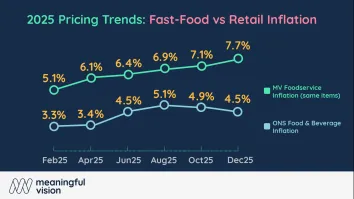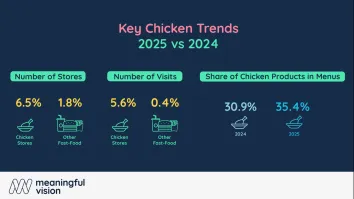
More consumers prefer eating out, spending less - study
As the number of foodservice outlets in the UK continues to grow and the choice of foods broadens, more people are opting to eat out than stay at home.
A new report by foodservice consultancy firms Horizons and JRA revealed that 66% of the foodservice operators that took part in the survey saw an increase in food sales in the 12 months to April 2015, with 21% reporting a ‘large’ increase.
Consumers are also spending less when eating out. More people were spending less than £12 per head, while fewer people were spending above £16.
Average spend had dropped from £13.10 in Spring 2014 to £11.03 in Spring 2015, with 62% of consumers spending an average per head of under £12, compared with 51% last year.
“People are now snacking more, or having one, or maybe two courses instead of three, which explains why average spend appears to have fallen. This backs up by our previous consumer research that shows that while spend has fallen back slightly, frequency of eating out is rising,” Emma Read, Horizons’ director of marketing & business development, said.
“Foodservice operators have done a great job at changing their offer and adapting to the way consumers eat out today, providing more foods that satisfy the snacking opportunity throughout the day. This, typically, means several small meals during the day, whether it be coffee and porridge bought to eat at our desks in the morning, a muffin with a coffee mid-morning or light snack in the afternoon,” she added.
Nearly half [48%] of operators surveyed reported that sales of snacks had increased year-on-year. Last year 40% of operators reported a rise in snack sales.
The research also showed that more people are eating out at the weekends. Some 42% of operators said they were serving more meals from Friday to Sunday. Just over a third said that they are serving more on Sundays with pubs and bars (61%) reporting the biggest hike in weekend sales.
The study interviewed 281 foodservice professionals between 6 March and 13 April of this year, as well as surveyed 2,194 internet users last 5-6 January.
























